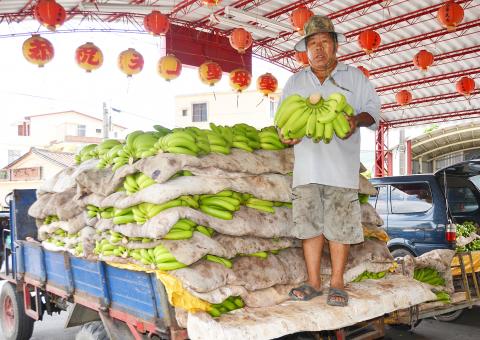The Council of Agriculture has touted plans to sell 2,000 tonnes of bananas to help farmers deal with a fruit glut, but with Taiwanese bananas selling below costs in China, academics are questioning whether politics is involved in the deal.
A report by China’s China News Agency said that the first 100 tonnes of Taiwanese bananas went on sale on Monday last week in Shanghai for 1.88 yuan (US$0.29) per 500g, or about NT$16.88 per kilogram.
However, the wholesale price for bananas at the end of last month was NT$20.50 per kilo at traditional markets in Taipei, averaging NT$17.70 for the whole month, and was NT$17.20 last week.

Photo: Yeh Yung-chien, Taipei Times
Taiwanese Farmers’ Rights Association chairman Wu Chiu-ku (吳秋榖) said retail prices were usually between NT$2 and NT$5 higher than the wholesale price, meaning that people in Taiwan purchased bananas at between NT$19 and NT$22 per kilo.
Once overhead such as transportation and customs taxes are factored in, the price of Taiwanese bananas in China should be higher, Wu said.
“How can Taiwanese bananas sell [for] cheaper on the Chinese market than in Taiwan?” Wu asked, adding that there was “something fishy” about the matter.
Wu Ming-ming (吳明敏), a professor in Kainan University’s marketing department, said the CIF — cost, insurance and freight — for a 12kg crate of Taiwanese bananas in China was US$9.50, or about NT$23 per kilo.
CIF means the seller is responsible for paying for costs associated with the delivery of the goods to the port of destination, as well as the purchase of insurance in the name of the buyer to cover potential risk of loss or damage to the goods during transport.
Adding a 5 percent tax, a 17 percent value-added tax (VAT) and 20 percent in management and marketing fees, every kilo should sell in China for NT$33.50 to meet overhead costs, Wu Ming-ming said.
It is unreasonable for bananas to be selling in Shanghai for less than half the overhead costs, Wu Ming-ming said.
Lee Yuan-ho (李元和), head of Fo Guang University’s economics department, said “zero distance” pricing and overhead showed that this was not normal trading practice, adding that as businesspeople would never invest to lose money, the government should explain who was covering the difference.
Market sources say that bananas shipped to China are being bought for between NT$10 and NT$12 per kilo, about the same price as those sold domestically.
The sources said that after packaging, transportation and handling fees were added, the CIF cost in China should be no less than NT$23 per kilo.
Hsiao Tung-chung (蕭柊瓊), deputy director-general of the Council of Agriculture’s International Cooperation Division, said the Taiwanese bananas sold in Shanghai last week were a commercial transaction between businesses based in Pingtung and Shanghai Fruit Co.
Translated by Jake Chung, Staff Writer

Several Chinese Nationalist Party (KMT) officials including Chairman Eric Chu (朱立倫) are to be summoned for questioning and then transferred to prosecutors for holding an illegal assembly in Taipei last night, the Taipei Police said today. Chu and two others hosted an illegal assembly and are to be requested to explain their actions, the Taipei City Police Department's Zhongzheng (中正) First Precinct said, referring to a protest held after Huang Lu Chin-ju (黃呂錦茹), KMT Taipei's chapter director, and several other KMT staffers were questioned for alleged signature forgery in recall petitions against Democratic Progressive Party (DPP) legislators. Taipei prosecutors had filed

Taiwan would welcome the return of Honduras as a diplomatic ally if its next president decides to make such a move, Minister of Foreign Affairs Lin Chia-lung (林佳龍) said yesterday. “Of course, we would welcome Honduras if they want to restore diplomatic ties with Taiwan after their elections,” Lin said at a meeting of the legislature’s Foreign Affairs and National Defense Committee, when asked to comment on statements made by two of the three Honduran presidential candidates during the presidential campaign in the Central American country. Taiwan is paying close attention to the region as a whole in the wake of a

NEW WORLD: Taiwan is pursuing innovative approaches to international relations through economics, trade and values-based diplomacy, the foreign minister said Taiwan would implement a “three-chain strategy” that promotes democratic values in response to US tariffs, Minister of Foreign Affairs Lin Chia-lung (林佳龍) said. Taiwan would aim to create a “global democratic value chain,” seek to capitalize on its position within the first island chain and promote a “non-red supply chain,” Lin was quoted as saying in the ministry’s written report to the Legislative Yuan submitted ahead of the legislature’s Foreign Affairs and National Defense Committee meeting slated for today. The Ministry would also uphold a spirit of mutual beneficial collaboration, maintaining close communication and consultations with Washington to show that Taiwan-US cooperation

Taiwan and the US have begun trade negotiations over tariffs imposed by US President Donald Trump earlier this month, Minister of Foreign Affairs Lin Chia-lung (林佳龍) said in an interview this morning before reporting to the Legislative Yuan’s Foreign Affairs and National Defense Committee. The Taipei Economic and Cultural Representative Office (TECRO), Taiwan’s de facto embassy in the US, has already established communication channels with the US Department of State and the US Trade Representative (USTR), and is engaging in intensive consultations, he said. Points of negotiation include tariffs, non-tariff trade barriers and issues related to investment, procurement and export controls, he